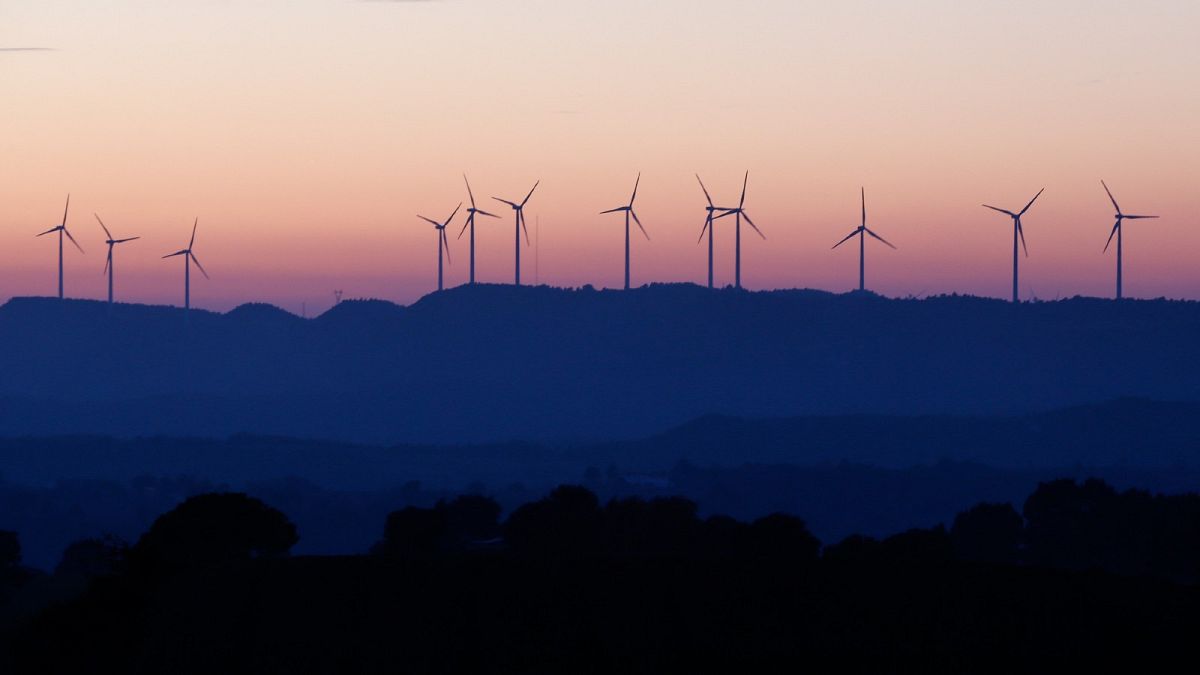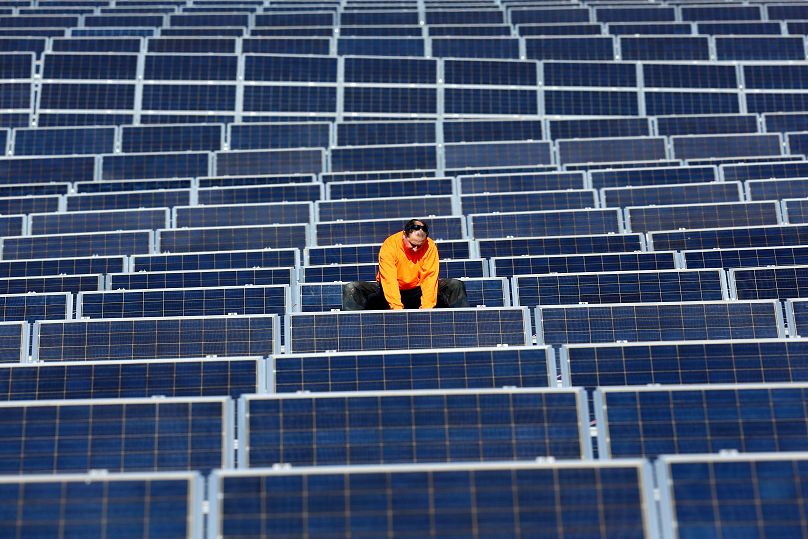Protesters have called it the "industrialisation of the countryside".
The acclaimed Spanish film Alcarràs tells the story of how a solar park uproots astruggling farming family growing peaches in Catalonia: a century-old orchard mercilessly trampled by progress; a family divided.
Winner of the Berlin International Film Festival’s Golden Bear and a box office hit at home, the film has clearly struck a chord with Spaniards.
That is likely because it comes as they witness the frantic race to build renewable energy plants across the country and harness Spain's unique combination of sun and wind.
The starting gun was fired when the current socialist government lifted the moratorium on renewables in 2018 and swept aside the notorious sun tax introduced by their conservative predecessors.
If you factor in Spain's vast areas of depopulated countryside and it’s a no-brainer for the sector’s investors, such as BP’s Lightsource, which has made the country their largest solar market in Europe and third globally.
Spain wants to generate 74% of its electricity from renewable sources by 2030 and is already a leader in Europe when it comes to wind energy. It had 1,265 wind farms and a wind power capacity of 28.1 gigawatts in 2021, second only to Germany in Europe.
'Saudi Arabia of Europe'
Such is the excitement, that it has even been suggested that one of Spain'semptiest regions -- Aragón, which sits between Barcelona and Madrid -- could become the Saudi Arabia of Europe, a reference to the kingdom's position as one of the world's biggest energy producers. By 2030, 10% of Teruel -- a province of Aragón -- could be covered by renewable energy installations.
But like all progress, the renewable energy boom has its detractors.
Javier Oquendo, spokesman for the Platform in Defence of Teruel Landscape, says the group is not against renewables per se, but rather the scale of what is being proposed. The Teruel platform and more than 200 others like it have grouped under the umbrella association ALIENTE (Energy and Territory Alliance) with the slogan: “Renewables yes, but not like this”.
Their first demonstration was staged towards the end of last year in Madrid and attracted as many as 15,000 protestors from across Spain. They demanded a different, scaled-down model, one that cuts out big energy firms with projects to export much of what is produced.
“The companies claim to bring work to the area,” said Oquendo. “But these machines are automated and the work is specialised. In one wind farm close to here, we think one person is employed but we don’t know who they are or where they live.”
The Teruel platform says it is against the “industrialisation of the countryside”.
For those in the tourism sector, such as Diego Pilaquinga who runs the Mas de Cebrian hotel in the Sierra Gudar-Javalambre, around 90 kilometres north of Valencia, the visual impact is particularly galling.
The hotel is on course to take a hit from Forestalia’s Maestrazgo solar project that will, if it goes ahead, cover 137 hectares with solar panels right on his doorstep, not to mention 22 wind farms in the vicinity.
“They plan to fill the field in front of the hotel with them,” said Pilaquinga. “People come here to see nature not to look out on a field of black panels. It will destroy the landscape, the habitat for the fauna here and could cause fires.
"If it goes ahead, we will take it to the supreme court. If that doesn’t work, we won’t survive.”
Some of these hectares belong to the Natura 2000 network of protected breeding sites for rare and threatened species. Although there is legislation against installing infrastructure in natural parks and special protection areas (SPAs), when it comes to the Natura 2000 network, the government’s line is merely indicative and can be overridden.
“These are areas of great beauty but the problem is the law doesn’t actually guarantee their protection," said Daniel López, of Ecologists in Action.
"And most of the renewable companies are here to make money.”
López does concede, however, that solar farms can be compatible with a range of environmental and agricultural initiatives, including grazing livestock. He cites as an example Endesa’s solar installation in Solana de los Barros -- in southwest Spain near the border with Portugal -- where sheep wander under the panels and a nesting project is underway.
“Many of the big projects are making sure there are positive repercussions on the local population,” said Pepa Mosquera, co-founder of the journal Energias Renovables. “The platforms are positive in that the pressure they apply makes this more likely to happen.”
But in some areas, the social contract between companies and locals is proving more of a challenge.
Forestalia, which has diversified its operations from the meat industry to become one of the biggest players in the Aragón region, is accused of speculation and being given a blank cheque by the government.
“If you say you don’t want their project, their response is that it’s not the public’s opinion that counts. It’s the legality,” said Oquendo.
He cites a viral video in which José Antonio Pérez -- the advisor to Forestalia's president Fernando Samper -- tells a protestor in Zaragoza in March: “If the villages of Matarraña oppose us, Europe will tell you where to get off” – or rather stronger words to that effect.
In his defence, Pérez said he was minding his own business when the protestor cornered him. “That’s their style,” he said. “They build their narrative on this kind of anecdotal incident.”
“A blank cheque would be impossible. There are auctions. We have been revolutionary in the sector and people don’t like that. We were the first company in Spain to renounce subsidies. We have democratised the industry in Spain. The people on these platforms play the victim. They are scared of change. They think they’re progressive but, in fact, they’re conservatives. In any case, you can’t save your village if you don’t first save the world.”
Rural communities divided
It's not only the big energy firms and protesters where the relations are strained.
Land can be expropriated if at least 80% are in favour of installing a project and that has put entire communities in Teruel at loggerheads, according to Oquendo, with vandalism issues surfacing in April.
“There are people who are in favour and people who are against," he said. "Meetings are heated and there are neighbours who have stopped speaking. So many different problems can arise. Imagine one family is paid for renting out their land for installations, but their neighbour gets nothing despite having to put up with the same visual impact.”
Most of the ALIENTE platforms would prefer to see 1,000 small projects instead of 10 big ones, with priority for self or local consumption.
“In the coal era, it wasn’t possible to put energy in the hands of the individual, but now it is,” said Oquendo.
But José Donoso, head of the Spanish solar association UNEF, dismisses this idea as “suicide.” He points out that the ecological transition is not just about “decorating the countryside. We can’t reduce the response to climate change to the capacity of the small companies”.
That said, UNEF has actually been fighting to reserve 10% of the market for players with projects under 10 kilowatts.
“We pushed the government to auction 300 megawatts specifically to small companies.
"When the auction took place, only 5 megawatts went under the hammer. We need €25 billion in investment to reach the 2030 National Integrated Energy and Climate Plan (PNIEC) target. Small companies simply don’t have that kind of money.”
Donoso added that believing we can respond to climate change with small companies alone is to be neo-negationist.
“These people may not deny climate change but they’re more dangerous for it because they oppose whatever policy there is to address it,” he said.
“They’re the biggest barrier to the ecological transition in the country right now.”
As for Alcarràs the movie, Donoso points out that the Catalonian village of Alcarràs does have a solar farm but it has been installed on land previously used as a deposit for waste from an industrial pig farm as opposed to a fruit orchard and has made the landowner very happy. Moreover, ripping out an orchard to make way for a solar farm would be against the law in the region.


